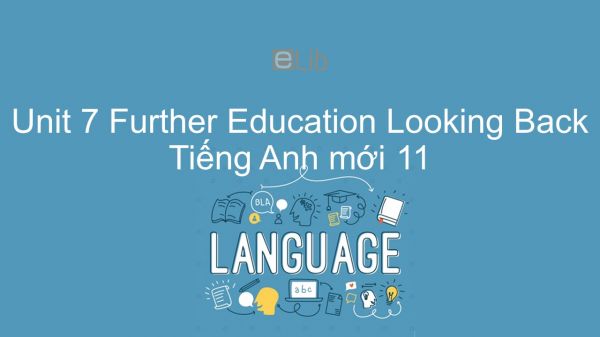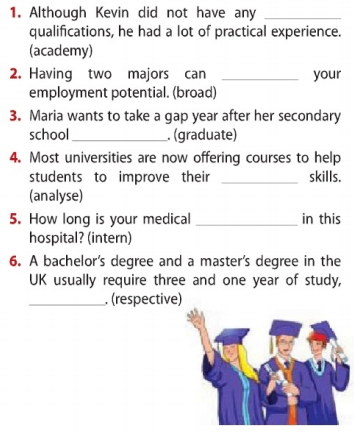Unit 7 lớp 11: Further Education - Looking Back
Bài học Unit 7 lớp 11 mới phần Looking Back giúp các em củng cố kiến thức bài học về phát âm, từ vựng và ngữ pháp liên quan đến chủ đề bài học "Giáo dục bổ túc". Mời các em cùng tham khảo!
Mục lục nội dung

1. Pronunciation
1.1. Task 1 Unit 7 lớp 11
Listen and repeat. Pay attention to the intonation. (Nghe và lặp lại. Hãy chú ý đến ngữ điệu.)
Click to listen
1. Why did you decide to study abroad? (Tại sao bạn quyết định đi du học?)
2. What is your major? (Chuyên ngành của bạn là gì?)
3. When are you going to apply for the scholarship? (Khi nào bạn sẽ nộp đơn xin học bổng?)
4. How long will it take you to complete the exam preparation course? (Bạn mất bao lâu để hoàn thành khóa học luyện thi?)
5. Where are you going to work during your internship? (Bạn sẽ làm việc ở đâu trong thời gian thực tập?)
1.2. Task 2 Unit 7 lớp 11
Listen and mark the rising (↗) or falling (↘) intonation for each question. (Nghe và đánh dấu ngữ điệu lên (↗) hoặc xuống (↘) cho từng câu hỏi.)
Click to listen
Guide to answer
1. What qualifications have you got? ↘ (Bạn có bằng cấp gì?)
2. Have you chosen a university to continue your education? ↗ (Bạn đã chọn được trường đại học nào để theo học chưa?)
3. Where are you going during your gap year? ↘ (Bạn sẽ đi đâu trong khoảng thời gian bỏ trống đó?)
4. Have you been searching for postgraduate scholarships? ↗ (Bạn đang tìm học bổng sau đại học phải không?)
5. How can we apply for an internship? ↘ (Làm thế nào chúng ta có thể đăng ký thực tập?)
2. Vocabulary
Complete the sentences, using the correct form of the words in brackets. (Hoàn thành câu, sử dụng dạng đúng cùa động từ trong ngoặc.)

Guide to answer
1. academic
2. broaden
3. graduation
4. analytical
5. internship
6. respectively
Tạm dịch
1. Mặc dù Kevin không có trình độ học vấn cao, nhưng anh ấy đã có nhiều kinh nghiệm thực tiễn.
2. Có hai chuyên ngành có thể mở rộng tiềm năng việc làm của bạn
3. Maria muốn dành một năm nghỉ sau khi tốt nghiệp trung học.
4. Hầu hết các trường đại học đang cung cấp các khóa học để giúp học sinh nâng cao kỹ năng phân tích.
5.Thời gian thực tập ngành y của bạn trong bệnh viện này là bao lâu?
6. Bằng cử nhân và bằng thạc sĩ ở Vương quốc Anh thường yêu cầu học ba năm và một năm.
3. Grammar
3.1. Task 1 Unit 7 lớp 11
Complete the sentences with the verbs in the box. Use the present perfect or the present perfect continuous. (Hoàn thành câu với các động từ cho sẵn trong khung. Sử dụng thì Hiện tại hoàn thành hoặc Hiện tại hoàn thành tiếp diễn.)

Guide to answer
1. Since January, we have taken part in three discussions on higher education.
(Kể từ tháng 1, chúng tôi đã tham gia vào ba cuộc thảo luận về giáo dục đại học.)
2. 1'm sorry I'm so late! How long have you been waiting for me?
(Xin lỗi tớ đến muộn! Cậu đã chờ tớ bao lâu rồi?)
3. How many academic courses have you (attended)?
(Cậu đã tham dự bao nhiêu khoá học rồi?)
4. I have been writing my research paper since October and I am trying my best to finish and submit it to my professor next week.
(Tôi đã viết bài báo nghiên cứu của tôi kể từ tháng 10 và tôi cố gắng hết sức để hoàn thành và gửi cho giáo sư của tôi vào tuần tới.)
5. Alice has been travelling in Viet Nam during her gap year and will return to the United States in December.
(Alice đã đi du lịch ở Việt Nam trong khoảng thời gian nghỉ học của cô ấy và sẽ trở lại Mỹ vào tháng 12.)
3.2. Task 2 Unit 7 lớp 11
Rewrite the sentences, using the present perfect or the present perfect continuous. (Viết lại câu bằng cách sử dụng thì Hiện tại hoàn thành hoặc Hiện tại hoàn thành tiếp diễn.)
1. The graduate students started arriving at four o'clock. They are still arriving.
(Các sinh viên tốt nghiệp bắt đầu đến lúc bốn giờ. Họ vẫn đang đến.)
2. The graduate students started arriving at four o'clock. They are all in the lecture hall.
(Các sinh viên tốt nghiệp bắt đầu đến lúc bốn giờ. Tất cả đều ở trong giảng đường.)
3. She started her research project last month. She's still doing it.
(Cô bắt đầu dự án nghiên cứu vào tháng trước. Cô ấy vẫn làm nó.)
4. They visited this college in 2009,2012 and 2014. (three times)
(Họ đã đến thăm trường cao đẳng này vào năm 2009, 2012 và 2014. (ba lần)
5. I started learning how to play the piano eight months ago. I'm still learning it.
(Tôi bắt đầu học cách chơi piano 8 tháng trước. Tôi vẫn đang học nó.)
6. I started discussing my research proposal with my professor at the beginning af my course. We're still discussing it.
(Tôi bắt đầu thảo luận về đề xuất nghiên cứu của tôi với giáo sư của tôi khi bắt đầu khóa học. Chúng tôi vẫn đang thảo luận về nó.)
Guide to answer
1. The graduate students have been arriving since four o'clock.
(Các sinh viên tốt nghiệp đã đến từ bốn giờ.)
2. The graduate students have all arrived at the lecture hall.
(Các sinh viên tốt nghiệp đã đến giảng đường.)
3. She has been doing her research project since last month.
(Cô đã làm dự án nghiên cứu của mình kể từ tháng trước.)
4. They have visited this college three times (before).
(Họ đã đến thăm trường cao đẳng này ba lần trước đó/ khoảng ba lần.)
5. I have been learning to play the piano over the last eight months / for eight months.
(Tôi đã học chơi piano trong tám tháng qua/ khoảng 8 tháng.)
6. I have been discussing my research proposal with my professor since the beginning of my course.
(Tôi đã thảo luận về đề xuất nghiên cứu của tôi với giáo sư kể từ khi bắt đầu khóa học của mình.)
4. Practice Task 1
Read the following passage and mark the letter A, B, C, or D to indicate the correct answer to each of the questions
Do you think education is better now than it was in your grandparents' time? Many older people in the UK believe the opposite. “Schools were better in our day,” they complain. “There isn't enough discipline these days. Kids don't work as hard as we did, either. The syllabus isn't as challenging, so clever students aren't being stretched enough. They need to study things in greater depth. Exams are much, much easier now as well.”
Were schools better years ago? Some British teenagers travelled back in time to a 1950s boarding school. They got a big surprise! The first shock came when the teenagers met their new teachers. Dressed in traditional black gowns, they look so frosty and uncaring! They were really authoritarian, too, so anyone caught breaking the rules - talking in classes, mucking about in the playground or playing truant – was in big trouble! Punishments included writing 'lines' or staying after class to do detention. The naughtiest kids were expelled.
Things were just as bad after class. At meal times the students had to endure a diet of plain, no-nonsense, healthy food. Homework was obligatory and it took ages! Copying essays off the Internet wasn't an option, as personal computers didn't exist in the 1950s!
At the end of 'term' everyone sat 1950s-style exams. The old exams were much longer than their twenty-first century equivalents and involved learning huge amounts of facts by heart. History papers were all dates and battles. Maths papers were trickier, too; calculators weren't around in the 1950s, so the students had to memorise multiplication tables and master long division. Our candidates found this really difficult.
The exam results surprised a lot of people. Students predicted to do well in their real-life, twenty-first century exams often got low grades in the 1950s exams. Does this prove modern exams are too easy? Do twenty-first century kids rely too much on modern technology, like calculators and computers?
The TV series of That 'll teach 'em! focused on a 1960s vocational school. UK school-kids study a range of academic subjects these days. But in the 1960s, children judged to be less ‘able' went to vocational schools. These helped them learn job skills. Boys studied subjects like metalwork, woodwork or gardening. In some classes, they even learned how to milk goats! The girls' timetables included secretarial skills. They also learned to cook, clean and sew - probably not much fun for most girls.
Question 1: What criticism is sometimes made about modern education in the first paragraph?
A. Teachers aren't strict enough.
B. The syllabus is out of date.
C. There's too much stress on exams.
D. The teaching methods are not good enough.
Question 2: The word "authoritarian”in the second paragraph is closest in meaning to ____.
A. inexperienced B. impolite C. unreasonable D. strict
Question 3: Which of the following statements is TRUE about the food the students ate at school?
A. It wasn't cooked properly. B. It wasn't delicious.
C. It wasn't nutritious. D. There wasn't much of it.
Question 4: The word "obligatory” in the third paragraph is closest in meaning to ____.
A. compulsory B. difficult C. long D. complicated
Question 5: According to the passage, how did exams in the 1950s differ from those in the twenty-first century?
A They covered more subjects. B. It took students less time to do them.
C. There was more to remember. D. They were less difficult.
Question 6: What was surprising about the students' results after taking the 1950s-style exams?
A. All the students found the exams difficult.
B. Students didn't do as well as expected.
C. Students who were predicted to fail did rather well.
D. Students did better than twenty-first century exams.
Question 7: The word “these” in the last paragraph refers to ____.
A. school-kids B. subjects C. series D. vocational schools
Question 8: Which of the following statements is TRUE according to the passage?
A. Vocational schools provided poorer children with equipment.
B. Vocational schools took children who were good at studying.
C. Vocational schools prepared students for employment.
D. Vocational schools were a complete waste of time.
5. Practice Task 2
Mark the letter A, B, C, or D to indicate the sentence that is closest in meaning to each of the following questions.
Question 1. Lisa has never studied abroad before.
A. It's the first time Lisa has ever studied abroad.
B. It's the last time since Lisa studied abroad.
C. It was the first time Lisa had ever studied abroad.
D. Never before Lisa has studied abroad.
Question 2. The last time my friend wrote a letter to me was in February.
A. I haven't never received a letter from my friend since February.
B. I last received a letter from my friend in February.
C. It was in February since I first received a letter from my friend.
D. My friend last wrote a letter to me when in February.
Question 3. Our school started building a new canteen in June. They are still building it now.
A. Our school have started building a new canteen from June till now.
B. Our school have been building a new canteen since June.
C. Our school have built a new canteen now since starting in June.
D. Our school are building the new canteen which started in June.
Để ôn tập các từ vựng và các điểm ngữ pháp đã học trong Unit 7, mời các em thử sức với đề kiểm tra trắc nghiệm Unit 7 Looking Back Tiếng Anh 11 mới sau đây.
7. Conclusion
Kết thúc bài học Unit 7 Tiếng Anh mới Lớp 11 – Looking Back, các em cần nắm:
- Ngữ điệu trong câu hỏi wh
- Các từ vựng trong bài
- Thì hiện tại hoàn thành và hiện tại hoàn thành tiếp diễn
+ Thì hiện tại hoàn thành diễn đạt một hành động xảy ra ở một thời điểm không xác định trong quá khứ hoặc diễn tả một hành động bắt đầu diễn ra trong quá khứ và vẫn còn tiếp diễn ở hiện tại.
Cấu trúc: S + have/ has + V3/ V-ed
Ex: I have watched “Iron Lady” several times.
+ Thì hiện tại hoàn thành tiếp diễn diễn đạt một sự việc xảy ra trong quá khứ nhưng vẫn còn tiếp tục ở hiện tại và có thể vẫn còn tiếp diễn trong tương lai. Chúng ta sử dụng thì này để nói về sự việc đã kết thúc nhưng chúng ta vẫn còn thấy ảnh hưởng.
Cấu trúc: S + have/ has + been + V-ing
Ex: I have been learning English since early morning.
Tham khảo thêm
- doc Unit 7 lớp 11: Further Education - Getting Started
- doc Unit 7 lớp 11: Further Education - Language
- doc Unit 7 lớp 11: Further Education - Reading
- doc Unit 7 lớp 11: Further Education - Speaking
- doc Unit 7 lớp 11: Further Education - Listening
- doc Unit 7 lớp 11: Further Education - Writing
- doc Unit 7 lớp 11: Further Education - Communication and Culture
- doc Unit 7 lớp 11: Further Education - Project



